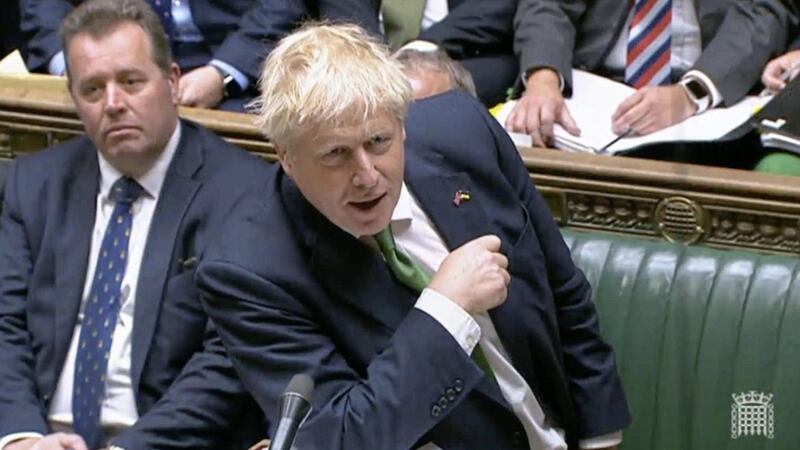Sometime in November, assuming we still don’t have a functioning assembly or executive, minds will turn to the ‘what do we do now’ question.
I think we’re supposed to have an election, albeit in the forlorn hope that what couldn’t be fixed between May and November would, courtesy of a miracle, be fixed early next year. Which is a bit like believing that my usual pessimistic disposition could—and it would also require a miracle—morph into a sunniness that would put Pollyanna to shame.
At the time of writing—Wednesday afternoon—there are rumours that Boris Johnson and Liz Truss (the worst, unfunniest double act since Cannon and Ball) are trying to pressurise the DUP into rebooting the assembly in return for speedier progress on the protocol bill. There’s no way Jeffrey Donaldson would give the nod of approval to returning to the executive at this point, but there is some hope that agreeing to the appointment of a speaker (which would allow the assembly to function in shadow-like form) would be an acceptable indication of gratitude for the bill having been tabled.
I’m not sure. According to a recent poll a very considerable majority of those who voted DUP/TUV/UUP in May agree with the DUP’s position of no return to normal business until the protocol is either dumped entirely or, at the very least, comprehensively overhauled. Whether that happens or not won’t be known until the bill had trundled its way through the Commons and the Lords and that is very unlikely to happen before November.
There’s also the little matter of the DUP having had its fingers very badly burned by Johnson and the ERG on three previous occasions, so I can’t imagine the party would take him on trust this time.
Donaldson is aware of another elephant trap. What happens if the DUP did take Johnson on trust, only to see the bill get either mauled or defeated over the next few months? He’d look like a fool and trying to take what would amount to revenge on the assembly would be viewed as particularly churlish. The DUP’s present strategy is the only leverage it has over Johnson (and he may not be around for much longer, either) and it knows that Johnson is the sort of leader who regards flexibility and compromise as signs of weakness.
There is another dimension to the DUP’s strategy. It has probably accepted that the protocol will continue to exist in one form or another, so what it’s really looking for is a sheaf of small, yet significant victories that it can sell as success. The sort of victories that wouldn’t necessarily be acceptable to diehard purists like Jim Allister but might be enough to win back the DUP voters who drifted to the TUV a few weeks ago yet who would still prefer devolution to direct rule.
What is really needed in all of this is something that reassures political/electoral unionism that Northern Ireland’s position within the United Kingdom hasn’t been weakened. I know some people don’t like to be reminded of the fact, but it is a fact that not one unionist party or elected unionist MP, MLA or councillor supports the protocol in its present form. That doesn’t mean they wouldn’t learn to live with a changed version of the protocol, but it does mean that the EU and British government need to address and resolve ongoing unionist concerns.
I’ve acknowledged in previous columns that a beefed-up UK/RoI border would have been unacceptable to nationalists in NI: which is why I supported a bespoke solution which considered our separate and collective community concerns and found a route through intensive negotiation at local level. For a variety of reasons—including RHI, the shutdown of the assembly in 2017, the DUP’s bizarre relationship with the Conservatives—the relationship between the DUP and SF soured to the point at which even civility became impossible.
It is, of course, a cliché, as well as another fact of life here, but progress cannot be made on the basis of just a victory for one side. The protocol dilemma cannot be solved by negotiations between the UK and EU alone. The local parties must be involved: if only because the rules which allowed the DUP to hold the institutions to ransom are the same rules which allow SF to do exactly the same thing further down the line. Indeed, both parties have been happy to deploy a veto as and when it suits their interests.
Anyway, back to where I came in. After you knock out the summer recesses and assorted holidays November isn’t actually that far away. Which means the parties will already be thinking about and preparing for an election. And when your mind is on an election it is usually resistant to compromise, concession, risk-taking or cross-party cooperation. See, I told you I wasn’t morphing into Pollyanna.








